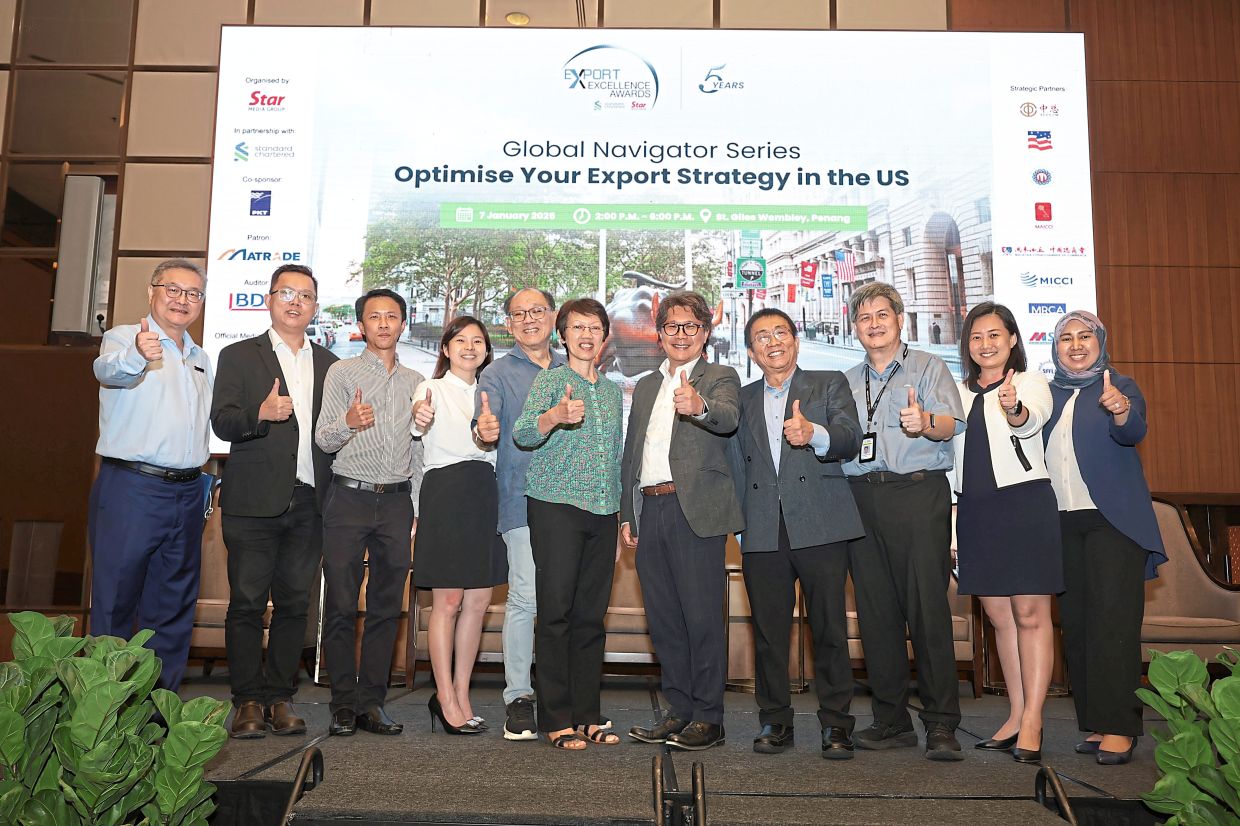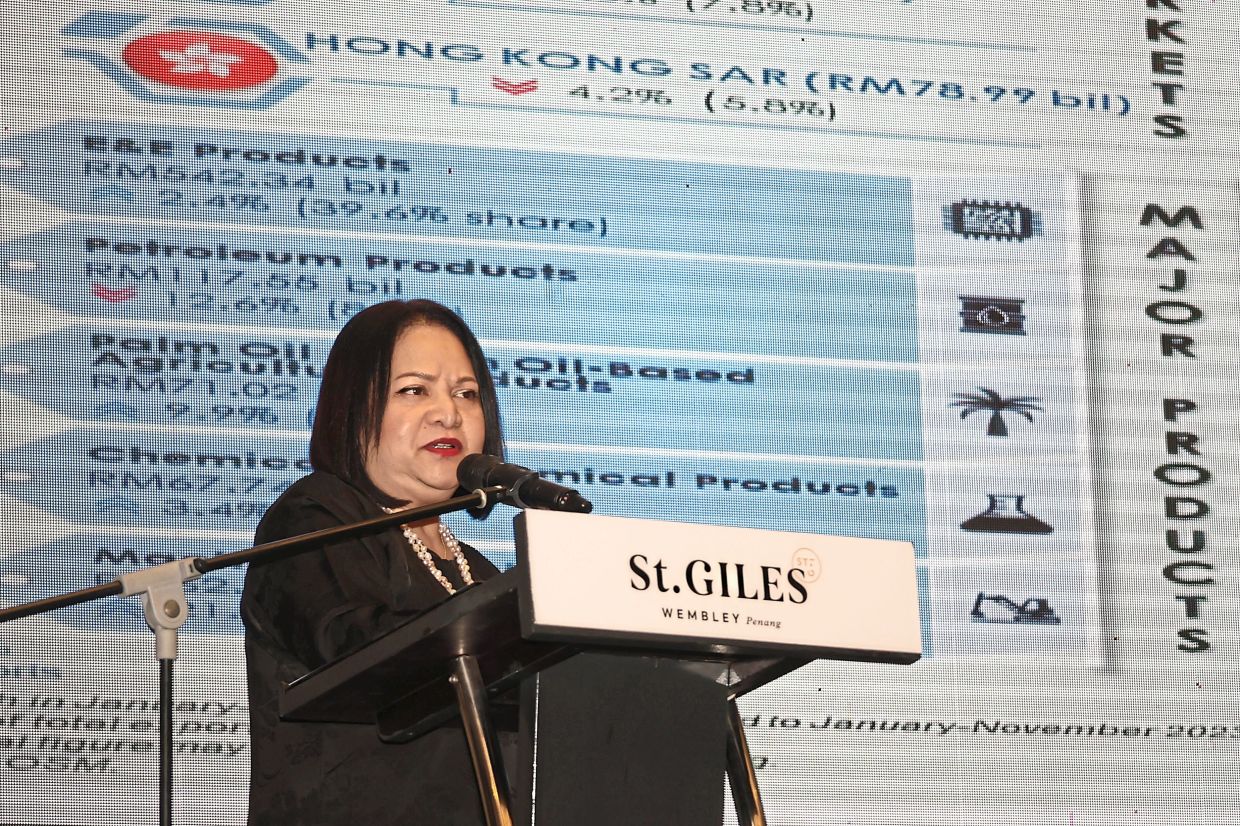
Expert panel: (From left) Matrade’s Siti Azlina, Standard Chartered Malaysia’s Tan, Transcargo Worldwide’s Ong and US-Asean Business Council’s Tina. Malaysia Semiconductor Industry Association’s Chan (right) moderated the panel discussion.
GEORGE TOWN: The possibility of President-elect Donald Trump’s administration imposing tariffs could lead to higher inflation in the United States, resulting in higher US interest rates and tighter monetary policy that could see the world’s largest economy spending less on imports, which will impact exporting nations like Malaysia, experts say.
Standard Chartered Malaysia economist and foreign-exchange analyst Jonathan Koh said US Federal Reserve (Fed) projections suggest a 50-basis-point (bp) cut in rates instead of 100 bps previously projected, as the disinflation process has stalled.
“The moderating of consumer spending power and the potential softening of the labour market are partly due to tight monetary policy in the United States,” Koh said.
US gross domestic product (GDP) is expected to slow to 1.8% in 2025 from 2.7% in 2024. Its inflation rate is expected to drop to 2.3% in 2025 from 2.8% in 2024.
Koh highlighted that the US dollar may remain strong, with interest rates remaining high in 2025.
On Malaysia, Koh said Standard Chartered was cautiously optimistic as the country’s GDP was projected to grow at 5% this year, a slight drop from 5.2% in 2024.
“The current upturn in the electrical and electronics sector, if it continues into 2025, will benefit Malaysia,” Koh said.
According to Koh, the Malaysian labour market has been stable as unemployment remains low.
“The recent hike in wages for civil servants’ and the flexible EPF (Employee Provident Fund) withdrawal scheme will support domestic consumption and economic growth.
“The withdrawal of subsidies from RON95 petrol will help fiscal consolidation, which is a welcome sign for foreign investors in Malaysia’s government debt,” he said.
According to Koh, the ringgit will slightly outperform regional currencies in the near term as fundamentals remain supportive.
“Still, the ringgit has outperformed strongly year-to-date, and the currency’s nominal effective exchange rate has risen 10% since last February, and now stood slightly above its 10-year average.
“US trade policies are a key risk to the ringgit in 2025. The ringgit typically has a high beta to the US Dollar Index and the Offshore Chinese Yuan Renminbi (CNH).
“As such, negative US trade policies and/or inflationary fiscal measures may weaken the ringgit against the US dollar,” said Koh.
He was speaking at the St Giles Wembley hotel in Penang last week to share insights during a talk on the macroeconomic outlook for the United States and Malaysia in 2025.
His presentation was part of the Global Navigator Series (GNS), an educational platform under the Export Excellence Awards (EEA) designed to empower Malaysian exporters with insights and strategies for succeeding in key international markets.
Speaking at the same event, Penang Chief Minister Chow Kon Yeow said if Trump raised tariffs, Malaysia may experience direct impact from reduced US demand for its exports, as US importers face higher prices.
“In 2023, the United States accounted for 11.3% of Malaysia’s total exports.
“This year, Malaysia’s economy is projected to grow between 4.5% and 5.5%, propelled by strong domestic demand and a variety of strategic investments in critical sectors such as technology, manufacturing, and renewable energy.
“Exports of goods and services contribute 62% to the nation’s GDP,” Chow said.
He added that continued trade protectionism from the United States, especially for semiconductors, could adversely affect Malaysia’s exports to specific countries, potentially subjecting them to embargoes or sanctions in line with the US Foreign Direct Product Rule.
According to Chow, the situation poses risks to Malaysia’s export activity and may complicate matters for small and medium enterprises (SMEs) and technology startups seeking to thrive in this environment.
“Trump’s (potential) tariffs worry US multinational corporations based in Penang, and they have expressed caution regarding the anticipated trade policies that could influence business strategies in the region, including expansion plans.
“Penang has consistently shown resilience and innovation, particularly in high-tech manufacturing, establishing itself as a vital player in the global supply chain.
“With the ongoing trade divergence, Penang has distinguished itself as a reliable partner for the United States, supported by its well-established electronics and semiconductor manufacturing ecosystem, which aligns seamlessly with US demand for advanced technology components,” Chow added.
He said Penang emphasised higher value-added activities such as integrated circuit design, advanced packaging, and equipment manufacturing, which align well with the National Semiconductor Strategy.
“This upward transition in the value chain will enhance Penang’s appeal to US companies seeking partners with advanced capabilities and intellectual capital.”
In 2023, the US emerged as Penang’s second-largest export destination, with exports amounting to RM76bil, representing 17% of the total.
Chow delivered a talk titled “Penang as a Gateway for High-Tech Exports: Unlocking US Market Opportunities” at the GNS event.
Standard Chartered Malaysia chief executive officer Mak Joon Nien moderated Chow’s talk.
The GNS event also featured a panel discussion titled “Sustaining Success: Evolving Strategies for Long-Term US Market Growth.”
The panellists were Malaysia External Trade Development Corp (Matrade) deputy director for electrical and electronics, ICT, machinery and equipment, Siti Azlina; Standard Chartered Malaysia regional head for SME Banking in North and East Malaysia, Tan Wan Yean; Transcargo Worldwide (M) Sdn Bhd director Ong Chin Keong, and US-Asean Business Council, Inc chief representative for Malaysia, Tina Jamaluddin.
Malaysia Semiconductor Industry Association director Andrew Chan moderated the panel discussion.
The event concluded with a presentation by Nurdiana Abdullah, head of the micro, small and medium enterprises unit at Matrade’s transformation and digital trade division.
The EEA is organised by the Star Media Group in partnership with Standard Chartered Malaysia, with PKT Logistics Group as a co-sponsor, and Matrade as a patron.
It is audited by BDO Malaysia.
Submissions for the awards programme are also open until Feb 13, 2025.
For more information on EEA 2024, go to exportawards.com.my or email eea@thestar.com.my.















































